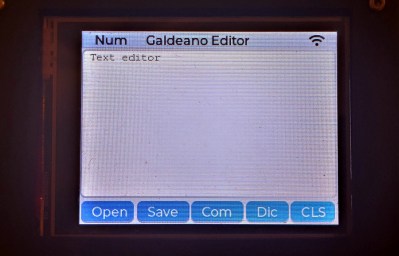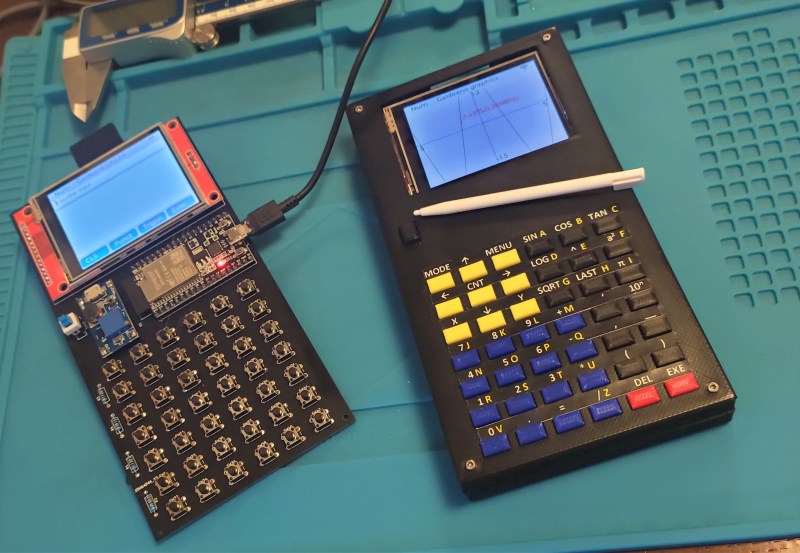Graphing calculators have evolved from expensive playthings for rich nerds to everyday tools for high schoolers worldwide. Even though teenagers nowadays carry powerful internet-connected computers in their pockets, math teachers often prefer them to use a clunky Z80-powered calculator in class, if only because their limited performance reduces the potential for distraction. The worst thing a lazy student can do is play a simple game like Snake or Tetris.
But what if you’re not a student anymore and you want a graphing calculator that has up-to-date hardware and infinite customizability in software? Look no further than [Angel Cabello]’s Galdeano, a handheld that has all the features of a modern graphing calculator plus a lot more. The heart of the device is an ESP32, which sits on a custom PCB that also holds a 6×7 array of push-buttons and a 320×240 touch-sensitive color display. It can be powered through a lithium-polymer battery or, like a classic calculator, through four AAA cells. The entire thing is housed in a 3D printed enclosure with color-coded buttons indicating various built-in functions.
 The ESP32 runs MicroPython along with a symbolic math engine called Eigenmath. This enables the Galdeano to manipulate expressions, perform integration and differentiation, and plot functions. Porting Eigenmath to a memory-constrained platform like the ESP32 was quite a challenge and required a few workarounds, including a memory partition scheme and even a custom compact font with mathematical symbols.
The ESP32 runs MicroPython along with a symbolic math engine called Eigenmath. This enables the Galdeano to manipulate expressions, perform integration and differentiation, and plot functions. Porting Eigenmath to a memory-constrained platform like the ESP32 was quite a challenge and required a few workarounds, including a memory partition scheme and even a custom compact font with mathematical symbols.
Thanks to the flexibility of MicroPython and the ESP’s WiFi system, the Galdeano is not limited to implementing a calculator: it can also perform various general-purpose tasks ranging from file editing to controlling a set of smart light bulbs. The project page doesn’t mention any games yet, but we’re sure it won’t take long before someone ports Tetris to this system as well.
Of course, even classroom-grade calculators can be pushed to do much more than their designers intended: they can receive GPS signals, run Debian or even perform ray tracing. If you’re looking for a powerful open-source calculator, this BeagleBoard-based machine runs the R statistical computing environment.

















Sigh. It’s not that I need a programmable calculator. It’s just that I wish I had the kind of job where it would be useful.
>> The project page doesn’t mention any games yet, but we’re sure it won’t take long before someone ports Tetris to this system as well.
Doom
I wanted to write this too.
Doom.
Looks able to run it just fine, maybe even with sound and networking for co-op or DM.
I would like to see a similar keypad and display, as a commercial option.
Drop the ESP chip, add power control (for those playing with battery types) and you have a pretty good front end. Alarm panels come to mind first, or irrigation systems.
Mounting a Pi / Teensy / Z80 / 65816 underneath would be for those who still want a calculator, but a thinner design. That just leaves mechanical keyboard purists, to argue about switch types.
Sounds like you want a NumWorks. I keep meaning to buy one.
I was also thinking about getting one, but then they decided to lock the firmware. I understand them, it is impossible to certify open design calculator for exams, anyone could put hacked firmware and cheat. But I couldn’t care less about exams, so idea to buy Numworks went trough the window.
I was also thinking about Swissmicros, they have some nice, hackable calculators, but the are RPN, and I never really liked RPN, it is a relic of seventeens when memory was expensive, and making expression parser on a calculator was impossible. Maybe I could write an algebraic expression parser for RPN calculator, just to annoy RPN priests… :-)
Esp32 is far more powerfull than a Z80 or 65816 … and head by head with teensy.
I was thinking about putting a PI, but it takes too long to boot
What a stonking project. Maybe add some Wolfram Alpha in to the mix?
if this will be open and put normal system like fuzix not problem to put wolfram alpha too
I will give it a try, but it is difficult to manage html in esp32.
how long this device work on 3 AA? lipo and AA (or 18650) is possible using together in this same time? (step-up-down) is possible make a place for microcontroler? some people put feather orange crab some teensy 150Mhz other 6502 etc. meybe add solar panel?
great project if this device work a week in one charge please put it on tindy
I have not ty how long will last in a charge … I will try and give you an answer
Are the sources published?
I want to publish it in github, but I have downloaded the lv-micropiton source and I am still working on creating a ‘branch’ (I am new to git .. .so I am slow with it)
I will post a log update in the projecto with the source.